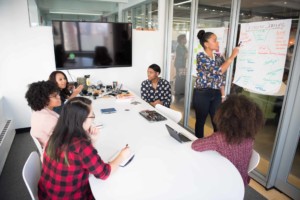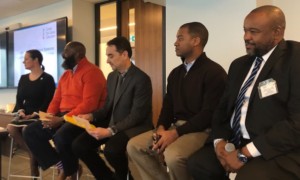Getting Clearer: Educator of Color

By: Jose Garcia.
The injustice and oppression have always been woven throughout our systems, but are laid bare in painful ways during this Covid-19 crisis. The reasons for taking a liberatory approach in how we think about school are only heightened during the current challenges we face. This series from New Tech Network coaches will explore what that might mean for how we show up for one another.
What does it mean to be an educator of color working in a racially unjust system?
“Are you an illegal immigrant?” This was the question I remember most from my first experience as a school development coach. I was with a group of teachers that I was supporting and went out to celebrate the work they had recently completed. I had only been a coach for two weeks and it happened after two long days of intensive professional development. If I was asked that question ten years earlier, my response would’ve been filled with anger and hate. Instead I responded by sharing my family’s history. It was at that moment I was reminded of the fact that my appearance and culture would always be at the forefront of my coaching. For many males of color being judged by your appearance is a common occurrence and can lead to a sense of anger and loss of hope at times. And, as we all have bare witnessed with the murder of Ahmaud Arbery, it can also lead to unjustified targeting and murder.
Know Your Triggers
It is important to identify words or behaviors that can trigger you during a workshop or coaching session so you can be prepared to speak your truth to ensure that your voice and perspective is validated. Over the years, I’ve had to develop different methods to help in both identifying my triggers and not allowing my emotions to control my thoughts. Two strategies that have helped me are, 1) writing down behaviors and words that have triggered me in the past and 2) I started to wear a “Beautifully Brown” pin on the label of my dress shirts. Prior to leaving to visit a school, I’d put the pin on naming my intentions for the day. At the end of the day, I reflect on my intentions as I take off the pin. This simple practice has helped center me throughout the day.
Understand the Local Context
As a child, my grandmother would take me on her shopping trips to downtown in Stockton, CA. During my childhood, downtown Stockton was not considered safe due to the high levels of poverty, drug use and overall condition of the area. It was during these trips that I would get to know a part of my hometown in a way that provided me a deeper understanding of the community in which I lived in. You can learn about the people and history of a community by visiting it’s downtown. Prior to my first day of coaching a new school I made a point of going a day earlier to walk the downtown area and around the neighborhood of the school that I will be supporting. I’ve learned it’s hard to support a school community if you are unwilling to get to know them.
Be Curious
At times, it’s easy to fall back on past negative experiences you may have had and easy to brush off someone’s push back or turn to anger for them not being open to change. When you find yourself in these situations, it’s important to listen to understand the person’s perspective by being curious. Do not assume you know what this person is experiencing.
Develop a Liberatory Mindset
To serve others’ towards a common goal rooted in racial justice is in its essence, a revolutionary act. As an educator of color it is important that we engage with others with our full self so that the students’ and communities we serve can prosper. At times, it can be far too easy to engage in an “us vs them” mentality which leads to the status quo prevailing. To engage in a liberatory mindset is to shift our perspectives that allows multiple truths.
To coach as a male, female or non-binary person of color requires a level of presence and understanding to the point it can take a toll on the mind and soul. During times of hopelessness, there is power in knowing you are not alone. To this end, it is essential for educators of color to find outlets where they can connect and engage in racial healing with other educators of color. “For me, it pushed me and other educators to form the “Colectiva of Raza Educators”, a space where a group of Raza Educators met regularly at each other’s home to engage in dialogue and self-healing. it was the first time many of us felt that we could speak our truths without judgement.” Individually we cannot heal from racial harm, but as a collective we can start down the path of healing and self-renewal.
Con Safos
José
For more, see:
- Getting Clearer: Liberatory Coaching
- Getting Clearer: Musings of An Urban Educator
- Getting Clearer: The Power in our Flowers
Jose Garcia is a School Development Coach at New Tech Network. You can find Jose on Twitter at @OrginalGarcia.
Stay in-the-know with innovations in learning by signing up for the weekly Smart Update.





Heather
As a New Tech school director I've always appreciated how much our School Development coaches have sought to learn about our community. Occasionally during a school visit I'll mention something happening locally and our coach will say, "Oh yes, I read your newspaper online and I saw that!"